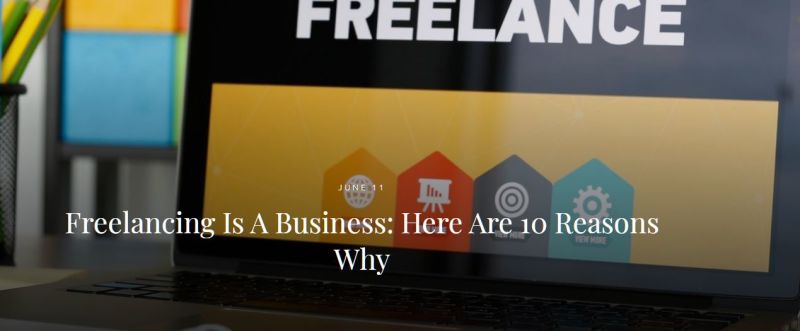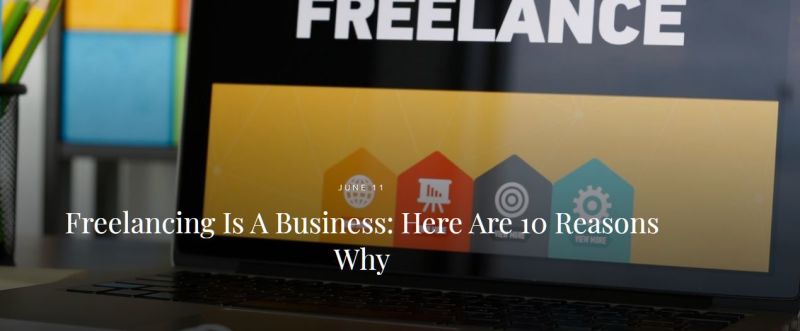
Freelancing Is A Business: Here Are 10 Reasons Why
Kathy Ennis, LittlePiggy

Sticking my flag firmly in the sand (and to shouts of “NO!” from some quarters), I am going to say freelancing is a business – and I’m going to tell you why.
Answer me this question:
What’s the Difference Between a Business Owner and a Freelancer?
(No, that isn’t the beginning of a joke!)
The answer is simple.
Nothing.
I’ve read so many articles about the supposed differences between freelancers, business owners and the self-employed. There has been so much coverage that readers could be forgiven for assuming they are all completely different to each-other.
But if you ask me, all those articles seem a bit unnecessary.
The only good they do is to stir up confusion amongst people who decide to take the plunge into self-employment.
For example, I recently read a piece about the difference between having a business and being a freelancer that was written by a business coach.
The business coach wrote “I am a self-employed business owner, but I outsource tasks to freelancers” – almost as though freelancers are a sub-species!
Clearly, this person felt they could describe their coaching services as a business, because they outsource to freelancers, who – in their opinion – do not own businesses.
But, tell me, what is the difference between a self-employed business coach and, say, the highly qualified freelance graphic designer they’ve just outsourced their logo design to?
What Do the Experts Say to the Question ‘Is Freelancing a Business?’
Who better to ask if freelancing is a business than the organisation responsible for the taxation of businesses in the UK?
Her Majesty’s Revenue and Customs.
According to HMRC, both the business coach and the graphic designer own a business.
In fact, that coach’s peculiar quote made me think of the ‘sniffy’ differences that are often drawn between academic and technical education.(Or if you prefer a funnier example, the famous Class comedy sketch, featuring John Cleese and the Two Ronnies!)
As a Business Mentor, new clients often ask me if they should refer to themselves as a freelancer or a business owner.
My answer is always the same; freelancing is a business, so a freelancer is a business owner.
Want some proof? Here’s a simple ten-point business checklist. All ten criteria apply whether you use the term freelance, solopreneur, consultant, coach, self-employed, side hustle, business owner …..
1. You Need to Know and Understand Your ‘Why’
Lots of questions start with “why” when you work for yourself.
The biggest are why: me; now; this business?
You also have to be able to answer why have you chosen to do things in this particular way.
Working for yourself can also feel isolating, so understanding why this business is so important to you will help to make it all worthwhile – particularly on ‘down’ days (which we all have from time to time!)
2. Your Business Planning is Crucial
For any successful business – regardless of size – the link between passion and profit is planning.
That means setting and reviewing clear, achievable objectives and targets that help you understand how your business is performing, and where you’d like it to be in the future.
3. You Have to Measure Your Results
In other words, you can’t just work hard and hope for the best.
There’s a famous saying that goes, “you can’t manage what you don’t measure”, and it’s a famous saying because it’s true.
If you don’t track and measure your business results, you won’t know how well or badly things are going. This means making future decisions will be much harder.
For example, if you know a particular product or service isn’t selling well, you could decide to make some changes, or ditch it altogether to focus on your top sellers.
4. You Have to Submit Annual Accounts
As I mentioned previously, HMRC makes no distinction between a freelancer and a business owner.
A freelancer can work as a sole trader, a limited company, or a business partnership, and they are expected to submit their annual accounts – and pay tax – accordingly.
If you don’t, there will be penalties…regardless of how you choose to describe yourself!
5. You Have to Make a Profit
Making a profit doesn’t just prove that you have a successful business, it means you’ll get paid for your hard work!
Profit will also allow you to grow your business into something bigger (if you want to) and afford to outsource some of those tasks that you either don’t like doing or those that need a level of expertise.
This brings us on to…
6. You Don’t Earn? You Don’t Eat!
You are self-employed, which means you’re responsible for paying your own salary.
And, like every business owner, you don’t qualify for sick or holiday pay – unless you’ve decided to put some money aside, or taken out insurance – to cover them yourself.
7. You Have Customers
Whether you call them customers, clients, or contracts – without them, you don’t earn money. With them, you have a business.
The other clear sign that customers is a good indication of whether you are a business or not is that you also have to:
- Constantly find new customers
- Nurture them
- Do your job well for them
- Make sure they pay you
8. You’re Responsible for Your Own Marketing
Finding the right customers means marketing yourself, and the products or services you offer.
This involves activities that allow people to find and get to know you. This can include setting up a website and social media pages, attending network events, building an email list…. And the list goes on.
9. You Have to Accept Taking and Managing Risk – It’s a Given
Running a business means every action comes with certain amount of risk.
I have seen too many business owners suffering from the paralysis of perfectionism – that great catch-all excuse for not ‘doing’ because it can’t be done until it’s perfect.
Nothing is in life certain. Even crossing a road comes with a certain amount of risk. It just happens that, in business, we have to make so many decisions – daily – it seems like every step we take has risks attached.
However, if you take a leaf out of the book of some famous, ‘risk-taking’ entrepreneurs – they all have a secret. They aren’t risk takers at all. They constantly measure, analyse and evaluate so that they can manage the potential risk involved in every move they make.
They keep up with things like trends, market changes, and competitor activity, so what seems like flying by the seat of their pants is actually a carefully calculated decision.
10. You’ve Got to Take Charge of Your Own Personal and Professional Development
When you work for yourself, there’s no swanky learning and development department, ready and waiting to book you onto an all-expenses-paid course!
On the flip side, neither will you have to sit in a draughty training room, learning skills you know you’re never going to use.
However, to stay competitive, every business owner has to continuously update their skills and knowledge, perhaps by taking on bigger and more in-depth projects, or by doing some focused training in different areas – the good news is, you get to decide!
Use Any Adjective You Want to Describe Yourself – You’re Still a Business
However you choose to describe yourself, if you’d like some help setting up or growing your business, this is how I help.
You can also arrange a complimentary, half-hour Breakthrough Session to talk through your ideas, challenges or concerns in more detail!
You can view this original article here